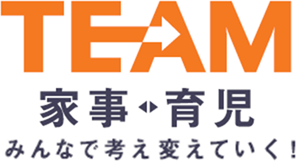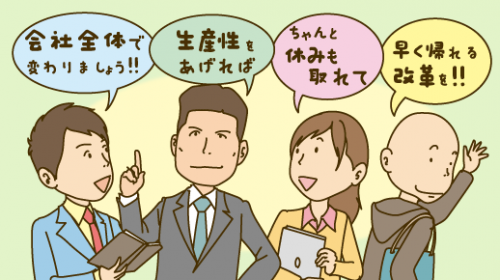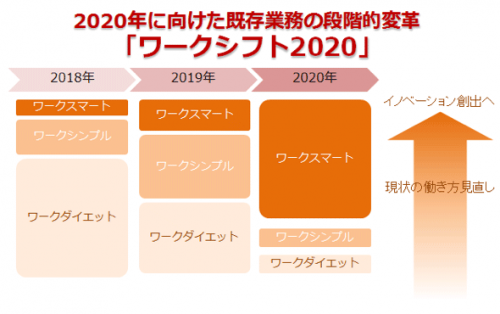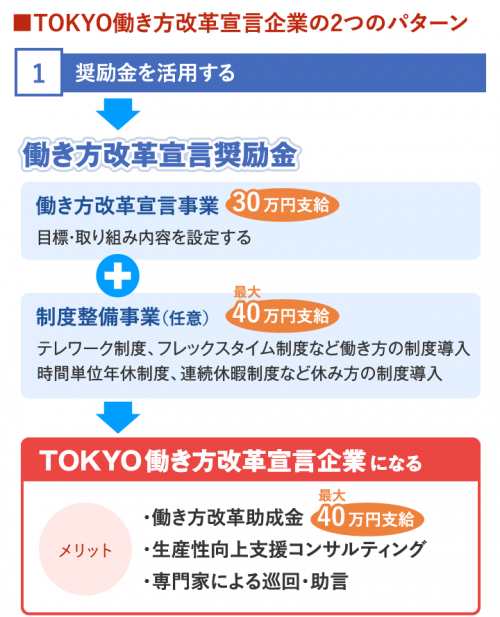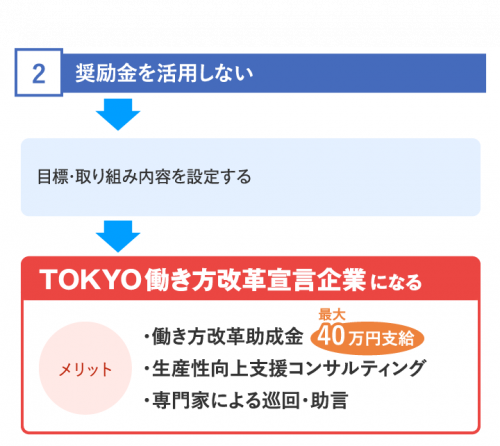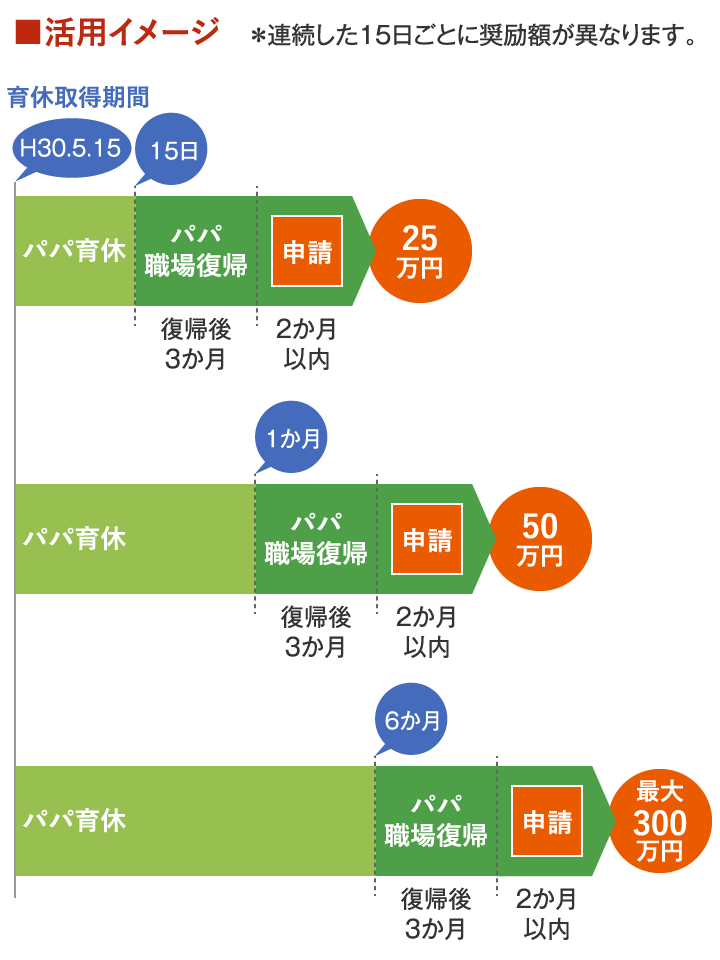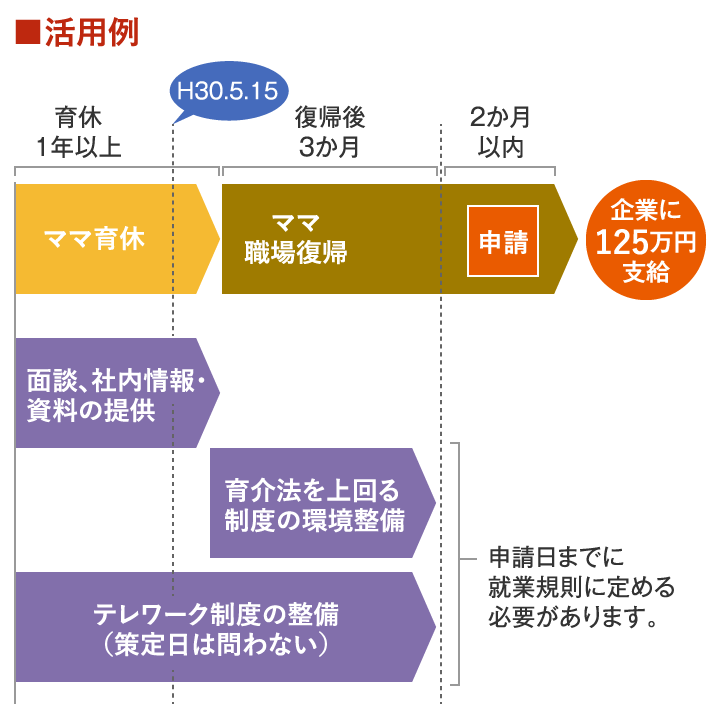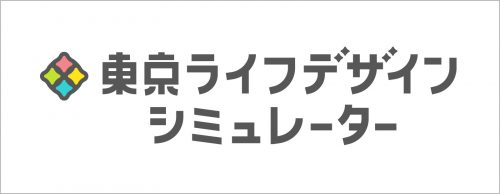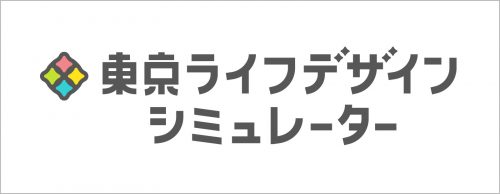Table of Contents
- Parenting cartoon: “It’s important to rest well.”
- <Company> Balancing work and family/work style reforms initiated at the company
Parenting cartoon: “It’s important to rest well.”
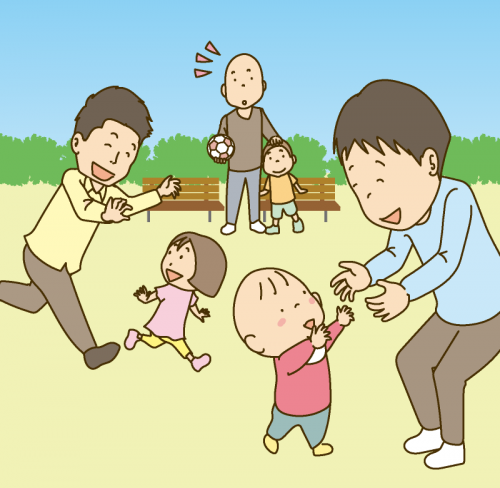



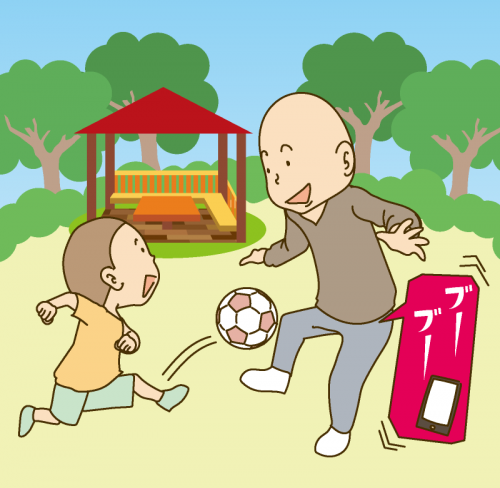




Profile
Eiichi
After working for a design company in Tokyo, he became a freelance illustrator. He is a hard-working father who creates animation, manga, and illustrations, including winning the Yubari International Fantastic Film Festival’s International Short Film Showcase Division Excellence in Animation Award.
<Company> Balancing work and family/work style reforms initiated at the company
The “Workplace Reform Law” will go into effect sequentially in April 2019. There are penalties for violations. This is aimed at creating a society in which people can choose to work in a way that balances life and work, while realizing diverse work styles, increasing holidays, and curbing long working hours. In this trend, an increasing number of companies are reforming their work styles by adopting new systems tailored to their own realities. What kind of reforms are on the menu and how are they being implemented? We will introduce the efforts of companies that are actively implementing reforms.
A minimum of five (5) days of annual paid leave must be granted.
Overtime work will be capped at 45 hours per month and 360 hours per year in principle. Even under special circumstances, overtime work of 100 hours or more per month, including work on holidays, will be prohibited.
Efforts shall be made to ensure a certain number of hours of rest from the end of the previous day to the beginning of the workday.
Unreasonable differences in basic salary and bonuses between regular and irregular employees within the same company are now prohibited.
*For details, please refer to the Ministry of Health, Labor and Welfare website.
https://www.mhlw.go.jp/stf/seisakunitsuite/bunya/0000148322.html
Companies that are ahead of the curve in work style reform
Case studies of “systems” that enable fathers to do housework and childcare too
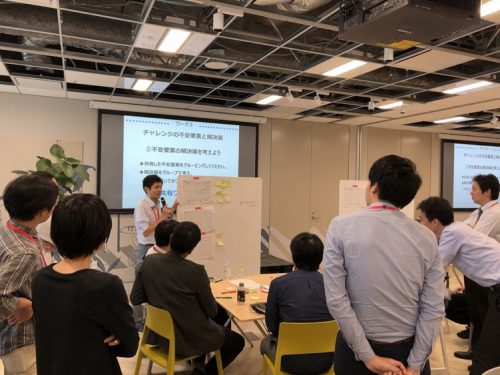 Fathers Workshop, an in-house event that brings together fathers and fathers’ families
Fathers Workshop, an in-house event that brings together fathers and fathers’ families
FILE:1 Okamura Corporation
Projected exchange of information among Ikumen employees
Okamura Corporation, a manufacturer and seller of furniture, industrial equipment, and other products that proactively addresses “work style reform” with an emphasis on work-in-life, has launched a variety of measures, beginning with the establishment of the Work-Life Balance Promotion Committee in 2016.
Diversity Promotion Project “Sodatel Project” launched.
Core hours of the flextime system were abolished.
Launched the “Working Style Frog Project,” a project to improve operations and raise awareness! Project” launched.
Fathers Workshop.”
Engaging Supervisors to Support Ikumen
Three new male Ikumen male members joined the company’s Sodatel Project, which aims to promote diversity, in FY 2018. As a system that tolerates diversity, the company actively supports “working fathers’ participation in housework and childcare.
These male members led the planning of the Fathers Workshop, which took place in the summer of 2018. The gathering consisted of about 30 male employees with children up to elementary school age and five to six of their supervisors.
We asked male employees who are raising children to discuss the division of household chores and childcare at home with their spouses in advance, and based on these discussions, we exchanged opinions on issues related to their respective work styles and their visions for the future. It was a great opportunity to exchange information and build a network, such as listening to Ikumen employees who are successfully balancing work and child-rearing while utilizing systems and mechanisms,” said Ms. Hiroyo Mochizuki, Manager of Diversity Promotion Office, Human Resources Department, Administration Division.
Another key point is the involvement of my supervisor in this project. Ms. Mochizuki said, “By learning in an open and frank manner about the challenges her subordinates face in child-rearing and housework, as well as their concerns about balancing work and family life, it has helped to raise the awareness of the supervisors. This should be very useful for future communication.
The Sodatel Project plans to package this program and roll it out nationwide.
Improved systems to support men’s housework and childcare
The company allows employees with childcare or nursing care needs to work from home once a week. Currently, of the 100 employees who use this service, about 30 are male. The company is also promoting time efficiency by offering employees the opportunity to work at other locations across Japan when they are out of the office.
Last July, 800 employees took advantage of telework on a trial basis, and the use of ICT tools has created an awareness within the company that working from home or from other locations is not a problem,” says Mochizuki.
The challenge for the future is that awareness of these various systems has not yet fully penetrated the market.
Every two weeks, we introduce new systems and activities on the company intranet. The company newsletter also introduces the voices of employees who are using the systems. By not only understanding the system, but also learning about specific cases of other employees, we can encourage employees to think, ‘Maybe I can use the system, too? I want to use it! We want our employees to think, ‘I might be able to use this system, too!
FILE:2 Yoshimura Corporation
Implemented overtime alarms and visualization of paid plans, etc.
Yoshimura is engaged in planning, manufacturing, and sales of food packaging materials. Yoshimura is a small-to-medium-sized company with about 220 employees, but it is also participating in the “TOKYO Workplace Reform Declaration Company System” promoted by the Tokyo Metropolitan Government in an effort to proactively address work style reforms.
The reality is that it is difficult to shorten working hours simply by sending out a message to reduce overtime. With recruitment also becoming more difficult, I think the challenge is how to increase productivity,” says Kayoko Ishii, Deputy General Manager of the General Affairs Department.
In March 2018, specific initiatives were launched, including the introduction of telecommuting.
Initiatives such as the overtime alarm system and “Mokaero Movement” posters
 Displaying “Mokaero Movement” posters to show that the entire company is involved in the campaign.
Displaying “Mokaero Movement” posters to show that the entire company is involved in the campaign.
We decided to introduce telecommuting so that female designers who have difficulty commuting to the company for family reasons can continue working,” says Ms. Ishii.
Telecommuting is one of the “telework systems” that the company introduced to reform its work style. The company has also set up a system that allows mobile work outside the office, which has led to an increase in productivity, which had been an issue for the company.
The second measure is an “alarm system” to prevent overwork. A monthly overtime limit is set and communicated, and employees and their supervisors are notified by e-mail when the limit is approached. Since the alarm system was introduced, overtime hours have decreased, which has led to the establishment of a cooperative system, such as flexible sharing of work at work sites,” said Mr. Ishii.
The third measure is the “System for Systematically Granting Annual Paid Leave.” Of the paid leave to be taken in a year, five days are applied for in October, the beginning of the fiscal year. Who will take leave and when is specified and shared in a notebook called a “management plan,” which is kept by all employees. This allows for smooth implementation of business plans, production plans, and meetings. Mr. Ishii says, “Having the paid holidays planned out from the beginning makes it easier for employees to take time off.
In addition, the “Mokaero Movement” poster is displayed within the company to promote awareness among employees.
Devices to reduce time for meetings
The company has long employed a unique meeting technique, which has also played a role in changing the work style. At the beginning of the meeting, all participating members have 20 seconds to talk about a topic raised on the spot during an ice-breaker.
Mr. Ishii said, “I learned to speak up, and at the same time, I gained a sense of time awareness, which helped shorten our meetings.
The introduction of an ICT-based conferencing system has eliminated travel time for meetings and other business trips, and has also been effective in sharing information.
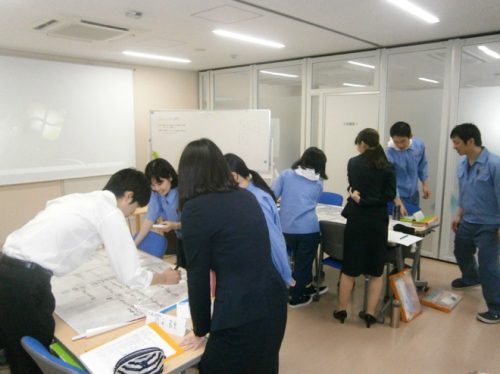 Incorporate innovations such as meeting while standing to save time.
Incorporate innovations such as meeting while standing to save time.
FILE:3 JTB Corporation
Meeting time compression and other productivity-enhancing skills
Work Shift 2020 Project” to be promoted as a three-year plan
The Work Shift 2020 Project, a cross-departmental initiative, is leading a change in the way JTB, a travel company, works. Members of the project include the heads of each division and business unit at headquarters, and are working to create an environment that will change the way people work, including systems and digital tools. As specific measures, we have established the steps of “Work Diet,” “Work Simple,” and “Work Smart,” and are promoting reforms step by step.
Work diet ・・・・Visualize work and focus on the essentials. Review wasteful work such as meetings, documents, etc.
Work Simplicity ・・・Organize information to speed up the process, and use ICT and other means to change the flow of work.
Work Smart… Create innovation and co-create value.
In addition, each workplace is taking on the challenge of specific initiatives led by the Smile Project; in 2018, town meetings for Smile Project committee members were held in 13 locations across the country.
In fiscal year 2018, we have focused particularly on work diets.
Reduce meetings: shorten time, carefully select the number of people, check materials in advance, stand meetings
Reduction of materials: Elimination of internal departmental materials, centralized management of shared materials, paperless
Reduce travel: videoconferencing, telecommuting encouraged
Reduce reporting: Eliminate debriefing meetings, use chat rooms for reporting while on the road or telecommuting, utilize 1-on-1 meetings, and format written reports.
Reduce workload: Use materials as much as possible, use RPA to reduce routines, and take notes during meetings.
*RPA: Abbreviation for Robotic Process Automation. Automates simple white-collar desk work with robots.
Keita Wanibe, deputy manager in charge of human resources planning, said, “In FY18, we have been working on this project to try to start where we can. The main focus of the work diet is to eliminate the various kinds of waste that exist today. To this end, we are also improving the ICT environment within the company and promoting the sharing of schedules and information. For telecommuting, we are expanding the conditions for use for reasons other than childcare or nursing care,” she says of her efforts.
Reducing travel time by allowing employees to go directly home and use other branches on the road, and reducing regular team meetings and increasing one-on-one meetings are examples of such efforts. We have also opened up one floor of our headquarters as a communication space, making it easier for employees to focus on simple meetings and work.
The company’s company-wide efforts to reform work styles and promote diversity are changing the mindset of our employees. Interest and willingness of male employees to take childcare leave is also increasing,” said Ms. Wanibe.
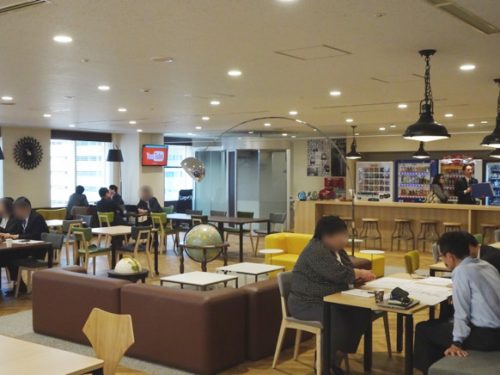 Expanded space that can be used freely for meetings. Private booths are also available so that you can concentrate on your work.
Expanded space that can be used freely for meetings. Private booths are also available so that you can concentrate on your work.
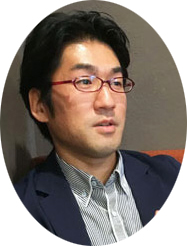
Manabu Tsukagoshi, Senior Consultant, Toray Management Research Institute
Many workplaces in Tokyo have begun reforming their work styles by reducing overtime, diversifying working locations such as telework and satellite offices, providing flexible working hours such as flextime, shorter hours, and staggered working hours, and introducing IT tools such as smart phones and tablets. However, in many cases, the reforms have been merely a call to reduce working hours. We need to review the quality and quantity of work to see how we can reduce working hours and create a more flexible work style.
Reforming work styles involves both productivity and communication reforms. Considerable ingenuity is required to reduce overtime and increase profitability. It requires determination and resolve to review business processes that have been in place for many years to increase productivity. In addition, supervisors, subordinates, and business partners must understand the work style reforms. Since many business issues and problems are known to the field, it is important to communicate honestly, identify issues, and link them to actions, etc.
Your company’s
Check “Ikubosu
Is Your Company’s Boss an Ikuboss Who Supports Ikumen Employees? Or is he or she a demotivating boss? In an increasingly diverse society, we asked Tetsuya Ando of the NPO Fathering Japan to advise us on a checklist for becoming an “ikuboss,” a boss who leads in creating a happy work environment for everyone.
if Ickbos.

Iqbosu Degree Check 15
- He excels at efficient work and has good time and people management skills.
- Ability to manage a short, small, open communication team.
- Devise ways to reduce the number of meetings, the number of people, and the amount of time spent in meetings.
- Set a goal time for the day, such as not including evening meetings or meetings from yourself.
- Proactively utilize IT tools to increase overall team productivity.
- Create a team that can recover without any one person.
- We can constantly review our operations and drastically stop “things that don’t need to be done”.
- When a subordinate leaves early or takes an unexpected day off for childcare or other reasons, you say to him, “Go home! Go home!” and “Take a day off! as a supervisor, to subordinates who leave early for childcare or other reasons.
- He has some knowledge of his subordinate’s family structure and other non-work-related circumstances.
- He knows some life information, such as what time his subordinates plan to leave the office.
- Listens to and communicates well with his/her subordinates, both at work and in his/her personal life.
- It can relieve the anxiety of subordinates raising children about their careers and give them a sense of psychological security.
- Build a relationship of trust so that subordinates feel comfortable discussing their personal circumstances with you.
- The goal is the growth of subordinates and the team as a whole, rather than one’s own advancement.
- He can demonstrate the importance of work-life balance by implementing reforms in his own work style and actively enjoying his personal life after 5 and on holidays.
Create a trusting relationship where subordinates feel comfortable asking for advice on their own.
Today’s companies have employees with a variety of circumstances, including not only childcare but also nursing care. Supporting them to successfully balance their respective private circumstances and work is what is expected of “ikuboss,” a managerial position. First of all, I would like them to be bosses who properly understand this point and are always aware of what they should do to work happily with diversity.
The Showa Era style of working, in which subordinates work overtime to accommodate their bosses, is no longer possible today. However, the current generation of workers in their 50s is the last generation in which “more-than-perfect” employees were considered acceptable, and most of them probably have little experience in child rearing. That is why I think the mindset of the bosses themselves is extremely important. It will be a plus not only for the “ikumen” employees, but also for the bosses themselves.
The key points are to improve work efficiency, build a team structure, and take care of employee motivation. In particular, “psychological safety,” which dispels anxiety about future career paths, would be a major factor in bringing out the best in employees and ultimately increasing their productivity.

advisor
Tetsuya Ando
Founder/Chairman of FJ, Representative Director of NPO Tiger Mask Fund, President of Life Shift Japan Inc. Father of two boys and a girl. After changing jobs nine times, including at a publishing company, bookstore, and IT company, he established Fathering Japan in 2006. He travels around Japan giving more than 200 lectures and corporate seminars a year, as well as participating in the ” Papa’s Picture Book Project,” a team of fathers who read picture books to their children. He is also active in the community with the motto “Enjoy being a father.
Tokyo Metropolitan Government
Utilize “work style reform” measures
The Tokyo Metropolitan Government supports companies that promote “work style reform” and the creation of an environment that facilitates housework and childcare for fathers.
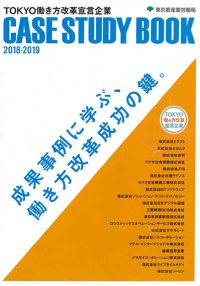
The “TOKYO Workplace Reform Declaration Company” system supports companies in Tokyo that are actively promoting work style reform. In order to encourage fathers to participate in childcare and housework, it is necessary to reduce long working hours and promote the use of annual paid leave. Since corporate efforts are essential for this, we are looking for companies that declare improvements in their working and vacation styles. This program started in FY2016, and more than 1,000 companies have declared reforms in their work styles every year through FY2017.
Companies that have declared reforms in the way they work will have their goals and initiatives publicized on the “TOKYO Companies Declaring Reforms in the Way They Work” website. Incentives can also be used to make declarations and develop individual systems. After the declaration, various support services by experts are also available. We will back up your company’s efforts to reform the way you work, from start to operation.
It is a system that brings many benefits from reforming work styles, including improved corporate productivity and brand image, as well as positive effects on recruitment.
At JTB Corporation, which became a declared company in 2017, “It is great that we can let people know within the company that we are a TOKYO Workplace Reform Declaration company, and we can promote reforms facing the same direction. In addition, the productivity improvement support consulting helped us receive guidance from experts on business process visualization (BPR) to eliminate waste,” said Keita Wanibe, JTB Human Resources Planning Manager, explaining the benefits of this system.
Promoting the ease of work both internally and externally through the “Workplace Reform Declaration.
Companies that have declared a change in work style are sent a “Declaration” describing their goals and initiatives. The Declaration can be used for internal posting and other purposes to help raise awareness. The Declaration is published on the Tokyo Metropolitan Government’s website. Examples of efforts by each company are also introduced.
System development with “Incentive for Declaration of Reform of Work Styles
(*Schedule for 2019 incentive applications will be posted on the “TOKYO Workplace Reform Declaration Companies” website as soon as it is determined.)
Incentives of 300,000 yen are offered to companies that set goals and details of their efforts as a declaration of work style reform.
Companies that have established a flextime system, telework system, hourly paid leave system, or continuous leave system as part of their efforts to reform the way they work will receive up to 400,000 yen in incentives, depending on the status of the system.
Generous support for declared companies
Free consulting by experts. Consultation is available on business reform, IT promotion, production management/equipment, human resource development/education, etc. (Maximum of 5 visits)
Subsidies are provided to companies that declare that they have reformed the way they work, and that have used the new systems that meet the requirements. 100,000 yen per system, up to a maximum of 400,000 yen per company.
Experts visit companies that have declared their commitment and hear about the status of their efforts. Advice on work style reform is provided.
An incentive program for companies in Tokyo that supports employees taking childcare leave. There are two types of courses: “Working Mothers Course” and “Working Fathers Course.”
In particular, the Working Dad Course encourages the creation of workplaces where it is easier for men to participate in childcare and household chores. According to the Ministry of Health, Labor and Welfare’s 2017 Basic Survey on Equal Employment, only about 5% of men take parental leave, and the duration is short. We aim to make it easier for men to take longer parental leave.
First, there is the happiness of workers and
The company is there to keep it going .
(*Continued from Part 5 )
Even before I took childcare leave, we had been talking about reforming the way we work within Cybozu, but at that time I myself was still in the old way of thinking. But after I took childcare leave, it was easier for employees to go home, we had a good reputation, and our way of thinking changed.
When my third child was born, I took not childcare leave but shortened working hours for about six months. This was also well received as the president would leave at 4:00 p.m. and important meetings would be over by then, and those working shorter hours could also attend.
The company can completely withdraw from the childcare leave, so it is necessary for the company to take over the childcare leave and to deal with the situation accordingly. If only the length of the workday is adjusted, there is less of a burden on both parties.
This is good for the family, and my wife was greatly pleased when I took a shorter workday during our third child. When you are raising a child, something happens every day. A fever, the flu, an injury, you never know when or what kind of call you will get. So, rather than taking a week or a month off, working shorter hours for at least six months or a year makes you much more of an asset to the family. It seems to me that it is better to work short hours and pick up the kids every day, or go to the grocery store, than to be an asset on a daily basis.
When I was the first, there was some criticism that it was not good from a crisis management standpoint for the head of a company to be away from the office. But we are not on the other side of the world, so when a crisis occurs, we go to work.
However, I had been working until 10 p.m., so when I left the office at 4 p.m., I was inundated with work. I couldn’t do it all by myself. So I changed my mindset and made my work team-based as well. When authority is transferred, the person who is entrusted with the job becomes more motivated, and a sense of speed emerges. Work that cannot be done by anyone else becomes a bottleneck and inhibits work sharing. In order for people with limitations, not limited to childcare or nursing care, to work together from now on, we must not make the work belong to a specific person. I think this is the key point. I am talking about a shift from individual to team competition, and the same is true of sales. Salespeople want to surround themselves with their own customers, but I don’t let them do this. If we share all the information about who we met with, when we met with them, and what we talked about, salespeople will also spend less and less time working overtime.
I compare working together with various people to a stone wall. If you combine people who can work in the morning with those who can only work in the afternoon, it can be more efficient than working alone.
As we promote the reform of work styles within the company, we receive some surprising comments such as, “I don’t want to ride the crowded trains, so please let me work from home,” or “I want to work on the side, so I want to work at Cybozu only three days a week. But it is important for the person’s life, and that is why they have the courage to come to me and say it. If I can create a place where they can do that, they will be more motivated and active than ever before. It took me a while to realize that structure, but once I did, I realized that this was the right thing to do.
I was not the first to take childcare leave, and everyone has been pushing for more and more reforms, including the no overtime rule. I took advantage of that. It became a reality because I was one of the first. With the Ikumen trend, the wind is now changing. If there is no precedent within the company for shorter leave and shorter working hours for men, we should do it. It will go down in history. Five years from now, I will be the head of the Human Resources Department. In five years’ time, he will be the head of the Human Resources Department. I would like to whisper in his ear, “If you are not doing it around you, you should do it.
Yoshihisa Aono
In 1997, he founded Cybozu with his boss, Mr. Noboru Takasuga, and his college senior, Mr. Shinya Hata. He has promoted work style reform within the company, reducing the turnover rate to one-sixth, and has taken childcare leave three times as a father of three children. In 2011, he began shifting the company’s business to cloud computing, which has grown to account for more than half of the company’s sales. He is an external advisor to the Ministry of Internal Affairs and Communications, the Ministry of Health, Labor and Welfare, the Ministry of Economy, Trade and Industry, the Cabinet Office, and the Cabinet Secretariat’s Working Style Reform Project, as well as vice chairman of CSAJ (Computer Software Association of Japan). He is also the vice president of the Computer Software Association of Japan (CSAJ). (PHP Research Institute).

